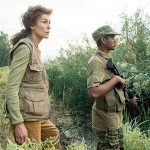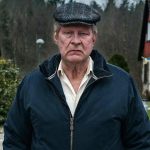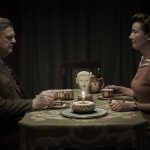A Thousand Times Good Night is an emotive study of a female war photographer (Juliette Binoche, Chocolat, The English Patient) torn between her passion for exposing third world suffering to make westerners ‘choke on their coffee’ and her guilt over leaving her family to fear for her death. While Norwegian Director Erik Poppe (Hawaii.Oslo) and the capable cast do a credible job creating the tension of the battle zones and family life, there are long preachy scenes characteristic of an amateur documentary, when, disappointingly, the war photographer is not even a real person.
Working from a script by Harald Rosenlow Eeg, Poppe hooks us from the start, which is the way to do it. With no expository dialogue, narration or other introduction, we find ourselves in Kabul, in the middle of a female suicide bomber’s ritual preparation. There is one oddity: a western photographer, dressed as a Muslim woman, is snapping away with a professional camera. She then asks to accompany the bomber in the car to the market place. This time, Rebecca Thomas (Binoche) has taken one risk too many.
Thomas’s husband Marcus (Nikolaj Coster-Waldau, Game of Thrones, The Other Woman) flies to the hospital in Dubai to take Rebecca home to their beautiful, sprawling house by the sea in rural Ireland (neither Rebecca nor Marcus have Irish accents). He gives her an ultimatum and, still suffering from the physical and mental trauma of the bombing, she promises to quit her job. But when daughter Stephanie, 13, (Lauryn Canny) asks her mother to accompany her to a ‘perfectly safe’ Kenyan refugee camp for a school project, the family has to come to terms with Rebecca’s vocation.
We have seen documentaries about male war photographers and have learnt that many are not married or have had problems sustaining relationships. But if you are a female war photographer and mother of a 13 and a 7-year-old, the conflicts are not restricted to the battle zones.
The interesting premise is undermined by characters breaking out in lectures. Marcus seems to be a marine biologist researching crab mutations attributed to the plutonium from Cumbria’s Sellafield nuclear power plant. He rambles on to a group of youngsters who are not alone in nodding when he asks them if they are bored. Refugee camp director Stig (Mads Ousdal) gives us some statistics on the refugee camp and we then learn that the naughty UN has failed to protect the vulnerable inhabitants.
Working on a modest budget, Poppe creates authenticity in the travel scenes, which were shot partly in Afghanistan and North Africa. There are, however, a few anomalies. Even if we buy that UN security troops would be despatched to the refugee camp a day or so after Rebecca’s photos were published, it is difficult to believe that Rebecca and Stephanie could hide the attack on the camp from Marcus. Surely he would have been aware of the incident, if only from seeing those very photos in the paper. Even if Rebecca’s name was not under the photos, he knew she was at that location and would put two and two together.
There are inconsistencies in the production design and make up as well. We see Rebecca’s face with deep gashes from the bomb, but she emerges from hospital without so much as a blemish, let alone a scar, on her perfect white skin. And long-haired, bearded Marcus seems to be a conservationist and animal lover, so it is odd that there are two sets of antlers hanging like hunting trophies in their living room.
Joyce Glasser – MT film reviewer




